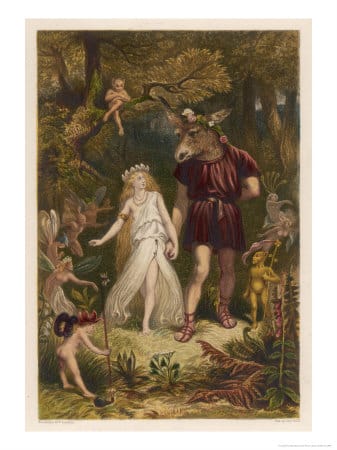Characters in Act 5
- Hippolyta
- Theseus
- Egeus
- Philostrate
- The Mechanicals:
- Bottom
- Quince
- Snout
- Starveling
- Snug
- Flute
- Demetrius
- Lysander
- Helena
- Hermia
- Robin a.k.a. Puck
- Oberon
Act 5 Scene 1
- Play comes to a full circle.
- Hippolyta and Theseus talk over the extraordinary stories from the four lovers. Hippolyta thinks they are “strange;” Theseus doesn’t believe them. However, Hippolyta believes that there is a significance in the stories the lovers have told and wonderful about them.
- After the weddings, Theseus chooses the laborer’s play brought by Philostrate (written in a list) to be the entertainment.
- Philostrate tries to dissuade Theseus from choosing the mechanicals’ play to be performed.
- Theseus insists that he will see it, “For never anything can be amiss/ When simpleness and duty tender it.” Even Hippolyta persuades him to change but Theseus is confident with his decision. He wants to enjoy the simple honesty of the mechanicals’ attempts to please him. “Trust me.” he says to Hippolyta.
- The laborers perform, making all sorts of ridiculous mistakes based on their fundamental misunderstanding of how theater works.
- Theseus and the lovers enjoy making fun of the laborers’ performance.
- After the play, everyone goes to sleep.
- Crude as it was, the play of Pyramus and Thisbe has passed the evening happily – the purpose of the play; success.
- The unconscious comedy has caught the spirit of the occasion; indeed, only at a happy time like this with an audience in such a celebratory and good natured-frame of mind, could the play have been well received.
- The fairies bless the marriages. Puck addresses the audience, saying, “If we shadows have offended,” just think of the play as if it was a dream. The magic of theatre as well.


Wow so great, perfect